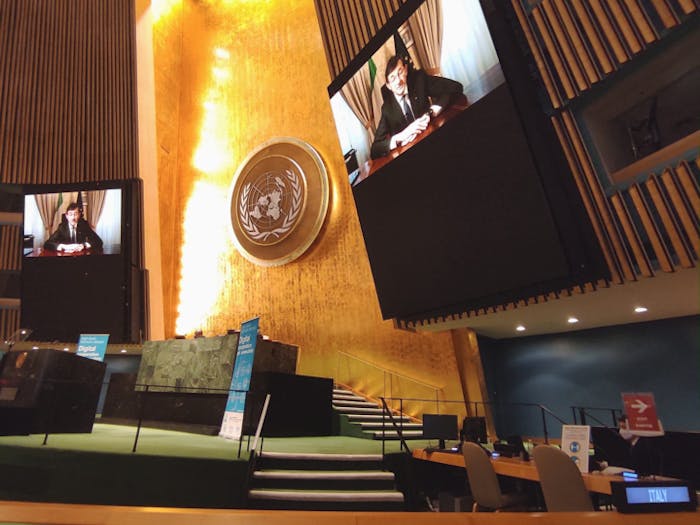Digital transition, a global challenge to reduce inequalities
Minister Colao delivered a video statement on the occasion of the High-level Thematic Debate on Digital Cooperation and Connectivity, UN Headquarters
Ladies and gentlemen,
The digital transformation is moving at an unprecedented speed globally. In 2019, 64% of European citizens used an online public service at least once. Yet, the growth and geographical distribution of digital transformation have been uneven. In 2018, only 20% of enterprises in OECD countries benefited from high-speed broadband, and among citizens, divides persist, in terms of sophistication of Internet use, in terms of generational use, and of course also geographically.
Indeed, the COVID-19 crisis has heightened concerns that digital transformation may contribute to widen performance and income gaps. Women, young people, low-skilled and non-standard workers experience starker income losses. According to UNCTAD, in 2020 only one in five people used the internet in Less Developed Countries. Low broadband quality hampered the ability for many to use teleconferencing tools, and cramped possibilities for students to access online learning. According to UNESCO, even in developed countries, 10% of pupils experienced issues with accessing digital education.
We believe that COVID-19 crisis may, and I would say should, turn into an opportunity for us: to herald a broad-based acceleration of the digital transformation and foster an inclusive digital society.
This is a challenge of both local and global dimensions. Country-specific challenges may vary. Italy’s strategy aims at closing existing digital gaps through investments in broadband connectivity, leveraging digital government services, and strengthening citizens’ digital skills.
Digital transformation to be impactful needs to be fed by trans-national synergies. The EU Digital Compass steers EU governments towards common policies and common goals. Accordingly, the Italian Presidency of the G20 is focusing on governmental cooperation and social inclusion, while driving economic growth through digital technologies. The international community could also benefit from multi-stakeholder partnerships on ‘digital identity’ – the possibility to provide citizens with digitized legal identities, ensuring seamless access to public and private services, in respect of individual rights.
For developing countries, digital identity is the opportunity to leapfrog outdated tools and build on mobile technologies to provide identifications for all. For advanced economies, to drive further the discussion of public-private and cross-border interoperability, and for citizens, to ensure they are fully engaged in democratic societies, and protected in their rights.
We are confident that by engaging in dialogues designed after a human-centric approach to digitalization we could achieve an inclusive and thriving global digital society. Thank you very much for your attention and have a very productive debate.
On 27 April 2021, The Italian Minister of technological innovation and digital transition, Mr. Vittorio Colao, participated in the High-level Thematic Debate on Digital Cooperation and Connectivity. The debate was convened by the President of the General Assembly of the United Nations at the UN Headquarters in New York. It highlighted the importance and urgency of political commitment at the highest levels to address the digital divide in support of COVID-19 adaptation, response and recovery efforts, in alignment with the SDGs.
The Minister Colao took part in the debate with a video statement, together with representatives of other Member States. In the video-statement, he recognized that the growth and geographical distribution of digital transformation is still uneven and expressed his concern that COVID-19 crisis may contribute to widen performance and income gaps.
In 2020, according to UNCTAD, only one in five people used the internet in less developed countries and, even in developed countries, 10% of pupils experienced issues with accessing digital education (according to UNESCO). Therefore, it is essential to turn this crisis into an opportunity to speed-up the digital transformation and foster an inclusive digital society.
We believe that COVID-19 crisis may, and I would say should, turn into an opportunity for us: to herald a broad-based acceleration of the digital transformation and foster an inclusive digital society

A transnational challenge: from local to global
As a result, the international community is facing a challenge of both local and global dimensions. As the Minister highlighted, Italy’s strategy aims at closing existing digital gaps through investments in broadband connectivity, leveraging digital government services, and strengthening citizens’ digital skills.
Furthermore, according to the Minister, digital transformation to be impactful needs to be fed by transnational synergies. Accordingly, the Italian Presidency of the G20 is focusing on governmental cooperation and social inclusion, while driving economic growth through digital technologies.
The role of digital identity
The international community, stated Minister Colao, could also benefit from multi-stakeholder partnerships on ‘digital identity’ – the possibility to provide citizens with digitized legal identities, ensuring seamless access to public and private services, in respect of individual rights.
For developing countries, digital identity is the opportunity to leapfrog outdated tools and build on mobile technologies to provide identifications for all. For advanced economies, it can drive further the discussion of public-private and cross-border interoperability.
In conclusion, Minister Colao emphasized the importance of engaging in dialogues designed after a human-centric approach to digitalization, in order to achieve an inclusive and thriving global digital society.
By engaging in dialogues designed after a human-centric approach to digitalization we could achieve an inclusive and thriving global digital society

